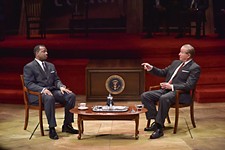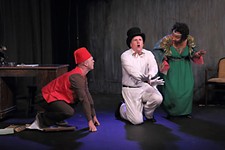A Human Interest Story
In 'A Human Interest Story,' the dirigo group shows us a world lighted only by the dim glow of television, which makes us aware how much is lost in the dark
Reviewed by Robert Faires, Fri., Feb. 24, 2006

A Human Interest Story
Blue Theater, through March 4
Running time: 1 hr, 15 min
The TV is on, and that's all that's on. So the only illumination is that soft, cool, bluish glow, like moonlight on snow, a glow so alluring that way that you really don't realize how little light comes from the set and how much of the room – of the world, for that matter – is lost in the dark when that thing is all that's on.
That's where we're taken in A Human Interest Story, as the dirigo group stages Carlos Murillo's play. The show opens in that familiar glow, with Ellie McBride bathed in a TV screen's serene light and speaking so quietly as to inspire calm, the tranquility of an evening cocooned in front of a favorite sitcom. But the longer she talks, the more she unspools the story of the mother of a teenage wannabe terrorist, describing in detail his trashed-out room and all its nihilistic excess and the video that revealed the fullness of his grim fascination with violence and death, the more aware we become of the dimness of the room, the more she and her surroundings recede into shadow. The lighting changes as the play moves on to other tales, but we never really shake that sense of encompassing darkness or the place television plays in its advance on us.
Part of that comes from Murillo's script, which interweaves four stories that all play off some connection to the tube. Besides the mother of the terroristic teen, there's the lonely man fascinated by a televised documentary on baboons, who recounts a visit he paid to friends he believed were happily married; and the well-heeled suburbanite preparing for her 15 minutes of fame (well, maybe three minutes) as a TV crew visits her home to do a story on her pussycat who paints. Then there's the witness to a politician's suicide (an account based on the actual 1987 suicide of Pennsylvania State Treasurer R. Budd Dwyer, committed at a press conference, where it was captured on camera and broadcast by several area stations); though shaken by what he saw, the man can recall it in great detail, as if it's caught on a video loop in his mind. In every instance, the tellers of the story find themselves shocked at their present circumstance and wondering how things could've come to this. In some way, they all find their reflection in that cathode-ray glass, in the celebrity it celebrates, in the violence it glorifies, in some message it communicates. It casts a light on them, but one that only shows them how deeply they're enveloped in shadow.
This disturbing message is conveyed by Murillo with strong storytelling tools: a rich accumulation of details, a tantalizing unfolding of narrative, distinct voices. His characters differ as much as the stories that open and close a newscast (truly: the "if it bleeds, it leads" suicide and the painting pussycat human-interest story), the variety accentuated by the differences in delivery by the dirigo cast: McBride's hushed, internalized mother; Heather Hanna's beaming, sprightly homemaker, so chipper and effusive she seems that she might at any moment break into dance; the halting, troubled suicide witness of Chronicle listings editor Wayne Alan Brenner, struggling with the memory of the horrendous act as with physical pain; and the genial cynic of Dan Dietz, drily dissecting the behavior of those around him – and himself – like the omniscient narrator of some nature documentary. As Murillo has specifically written this to be played without visuals – slyly keeping from us
the seductive, addictive visual stimulation of television – voices are key, and director Lowell Bartholomee has orchestrated them in compelling counterpoint. They rise from the dark, above the hiss of the snowy screen, as an anguished chorus, asking us if we know how we came to this point, this treacherous pass. Know this: You won't hear the answer on the 10 o'clock news.










